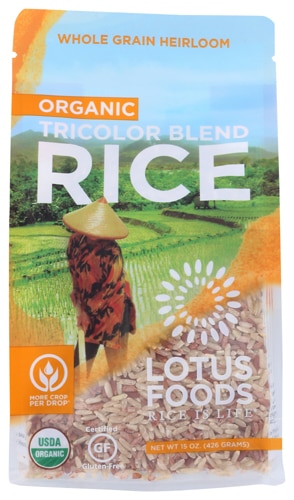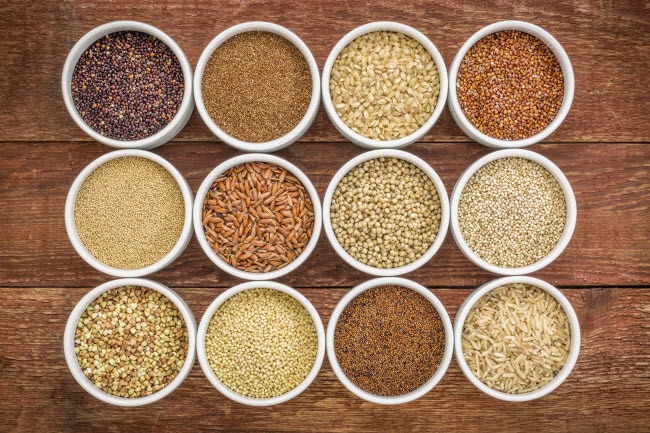It’s something we hear all the time: eat more whole grains. As a registered dietitian, I can tell you, it’s good advice! The benefits of whole grains as part of a nutritious diet are widely known – and wide ranging. From helping with healthy weight maintenance to lowering blood pressure, managing blood sugar and even preventing cancer, adding more grains to your diet can have exceptionally positive effects on your health.
Whole grains vs refined grains
Grains are typically divided into two categories or types: whole grains and refined grains. Whole grains contain the entire grain kernel, including the bran, germ, and endosperm. Refined grains have been milled, a process that removes the bran and germ. This is done to give grains a finer texture and improve their shelf life – but, it also removes dietary fiber, iron and many B vitamins.
Whole grain foods, specifically 100 percent whole grain foods, are packed with vitamins, nutrients and antioxidants that you don’t get with refined grains.
What to look for when shopping for whole grain foods
When shopping for a whole grain food or snack, always check the label to ensure that the first ingredient is actually a whole grain. Look for the word “whole” at the beginning. Some whole-grain ingredients include whole oats, whole-wheat flour, whole-grain corn, whole-grain brown rice and whole rye. Foods that say “multi-grain,” “100% wheat,” “high fiber,” or are brown in color may not be a whole-grain product.
It’s easier than you think to add more grains to your diet. Start by making simple swaps (make brown rice instead of white rice, for example), and focus on these top 10 foods:
1. Brown rice
A super source of fiber and nutrients, brown rice is a great addition to your diet. Its mild nutty flavor is enjoyable, and you can easily make a big batch at the beginning of the week to pair with lean proteins and veggies for balanced, satisfying meals.
2. 100% whole wheat bread
Replace your usual slices of white bread with whole wheat bread to amp up nutrition with your morning toast or lunchtime sandwich. Always look for “whole wheat flour” as the first ingredient, and avoid foods that have the word “enriched” anywhere on the ingredients list.
3. Oatmeal
Oats are another great source of fiber, which helps to keep you full for a longer period of time. Try eating a serving of cooked oatmeal in the morning to help power you through until lunch, but be careful not to overload your oats with sugar-laden toppings like brown sugar or honey. Instead, sweeten your oats with natural sugars such as fresh fruit or dried fruit with no added sugars.
4. Barley
Barley has a hearty texture and nutty flavor which makes it a great addition to soups, salads or grain bowls. Try pairing barley with veggies and beans for a nutrient packed, plant-based meal.
5. Whole grain cereal
Need a convenient breakfast or snack? Look for whole-grain cereal cereal with whole grain as the first ingredient (e.g. oats, whole wheat flour) and one that contains at least 3 grams of fiber and 5 grams of protein.
6. Quinoa
Quinoa is a powerhouse whole grain that is also a “complete protein” as it contains all the essential amino acids. Quinoa is incredibly versatile: use it on top of salads, in soups, as a grain bowl base or in plant-based quinoa burgers. Quinoa can even be enjoyed as breakfast when topped with cinnamon and fresh fruit!
7. Farro
Given its high protein and fiber relative to other whole grains, farro is a perfect grain if you really want to feel satisfied after eating. You’ll also feel more energized since it takes the body longer to break down and digest protein and fiber rich foods.
8. Whole-wheat pasta
Replace white pasta with whole wheat spaghetti to help you feel full and energized rather than sluggish after a pasta meal. Also, be sure to pump up your pasta with a serving of veggies to help control portions and balance out your bowl!
9. 100% whole wheat English muffins
Whole wheat English muffins are perfectly portioned and make a quick healthy breakfast or afternoon snack. Top one with peanut butter or almond butter for a balanced bite.
10. Popcorn
Many people don’t realize popcorn is 100 percent whole grain, in addition to being low in calories and an excellent source of dietary fiber. Look for air-popped popcorn that's low in sodium (less than 150 mg) for a crunchy and delicious whole-grain snack.




